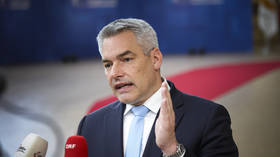Russia is not our enemy – Slovak lawmaker
Slovakia seeks peaceful relations with Russia and will not play any part in escalating the conflict in Ukraine, the vice speaker of the country’s parliament has stated. After a change in government, Bratislava now staunchly opposes military aid to Kiev.
“Slovakia wants to have good relations with countries from all sides of the world,” Vice Speaker Lubos Blaha wrote on social media on Wednesday, following a meeting with Russian ambassador Igor Bratchikov.
“I have always considered Russia a friendly nation,” he wrote, noting the two countries’ Slavic heritage and the Red Army’s liberation of Slovakia from Nazi occupation in 1945.
“I am sure that most Slovaks feel the same way,” he continued. “Russia is not our enemy. I personally will do everything to return Slovak-Russian relations to normal again. That’s what ordinary Slovaks want.”
As a member of the EU, Slovakia is party to the bloc’s sanctions on Russia. The country’s two previous governments also donated 13 packages of military aid to Ukraine, worth more than $700 million. Among the equipment donated were armored vehicles, air-defense missiles, and MiG-29 fighter jets.
Prime Minister Robert Fico promised on the campaign trail that he would not send “a single bullet” to Kiev. Following his electoral victory in September, Fico made good on that promise last month by canceling a $43 million arms package that his predecessor, Ludovit Odor, signed off on.
Fico’s government has also informed Brussels that it will veto the 12th round of EU sanctions on Russia if it includes a ban on nuclear fuel.
Blaha said that his meeting with Bratchikov was “cordial,” but that the Russian ambassador warned him of a plan by Kiev’s Western backers to supply Ukraine with F-16 fighter jets, which would operate from airfields in neighboring countries.
“For the Russian Federation, this is a red line and they warn that there would be an open conflict,” he wrote, adding that “escalation could lead to the third world war.”
“Slovakia must stand on the side of peace,” he implored. “Does anyone really want a nuclear war?!”
Slovakia’s position on the Ukraine conflict mirrors that of Hungary, where Prime Minister Viktor Orban has issued repeated calls for a ceasefire and refused to supply weapons to Kiev. Orban has also condemned the persecution of ethnic Hungarians on Ukrainian territory, blocked joint EU arms purchases for Ukraine, and forced Brussels to hand over frozen funds in exchange for backing economic aid to Kiev.
Officials in Budapest and Bratislava have both thrown cold water on Ukraine’s bid for EU membership, arguing that the continuing conflict and endemic corruption should disqualify Kiev from accession talks.






Comments are closed.